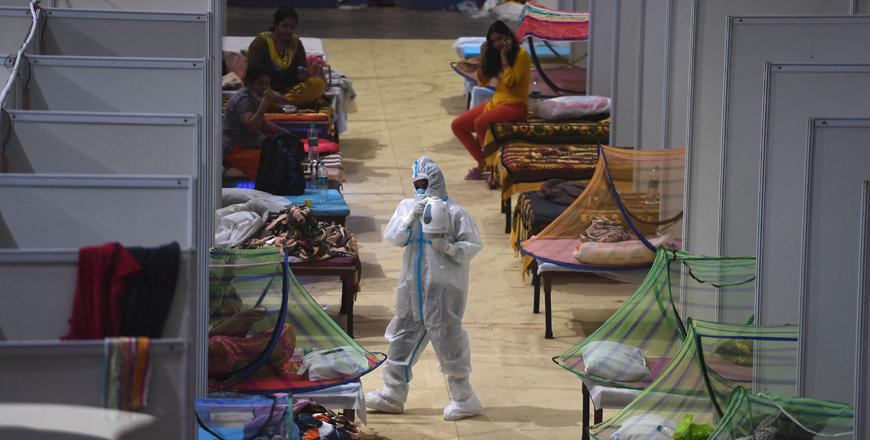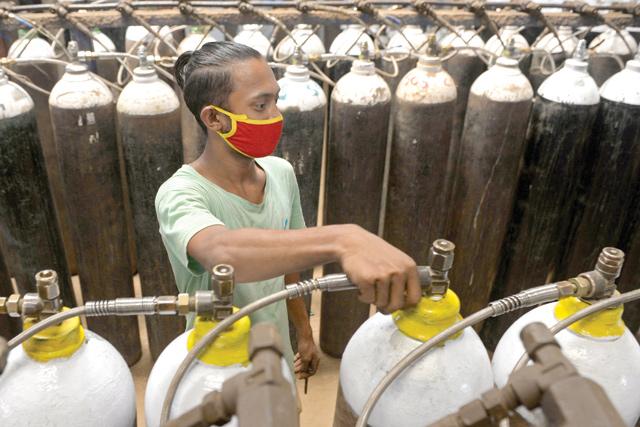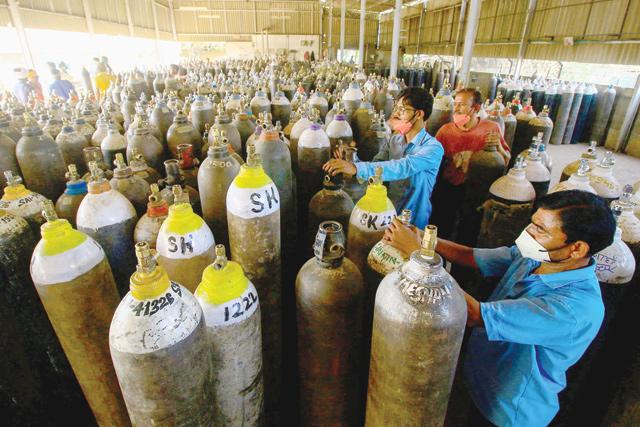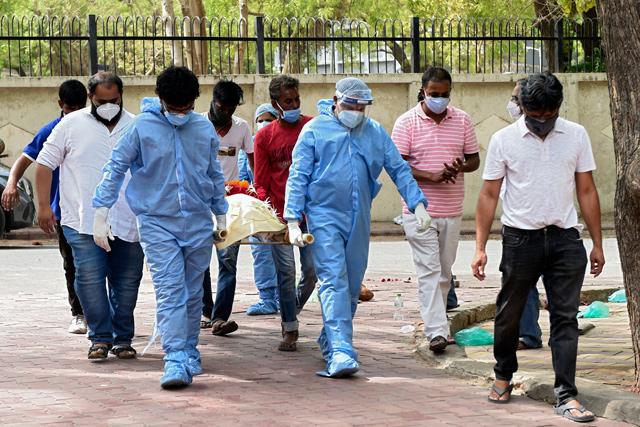You are here
More COVID-19 aid lands in India as Canada, Brazil struggle with outbreaks
By AFP - May 03,2021 - Last updated at May 03,2021

A health worker wearing a personal protective equipment suit attends COVID-19 coronavirus patients inside a centre of the Commonwealth Games village temporarily converted into a COVID care facility, in New Delhi, on Sunday (AFP photo)
NEW DELHI — India struggled to contain one of the world's worst coronavirus outbreaks with nearly 400,000 new infections reported Sunday, as more international aid arrived in the South Asian nation to help end the crisis.
Surges in Brazil and Canada also highlighted the persistent threat of the pandemic, with the COVID-19 death toll approaching 3.2 million even as many nations ramp up vaccination drives.
India expanded its vaccination programme to all adults on Saturday, but many of its states are struggling with shortages despite an export freeze for shots produced in the country.
Long queues were seen at vaccination centres in cities across the nation at the weekend, with people desperate to be inoculated against a disease that has overwhelmed the healthcare system and even crematoriums and graveyards.
"We are here early in the morning to get vaccinated... I left my three-year-old at home to get vaccinated," said Megha Srivastava, 35, at a private immunisation centre in the capital New Delhi.
"It is a necessity now. We are seeing so many people testing positive."
Social media platforms have been flooded with desperate pleas from people looking for oxygen cylinders, medicines and hospital beds as the COVID-19 wave causes widespread shortages.
India reported more than 392,000 new cases and nearly 3,700 COVID-19 deaths on Sunday.
The dire situation prompted many nations including the United States, Russia and Britain to send emergency supplies including oxygen generators, face masks, and vaccines.
Aid from France reached India on Sunday, including eight oxygen generator plants and 28 ventilators, adding to the 120 ventilators from Germany that arrived a day earlier.
New Delhi, one of the hardest-hit parts of the country, extended its lockdown by a week on Saturday, and the eastern state of Odisha has also ordered a shutdown.
Anthony Fauci, the top US pandemic advisor, said in comments published Saturday that the whole of India should go into lockdown to fight this wave.
Prime Minister Narendra Modi’s government has resisted imposing a national shutdown but many states have imposed heavy restrictions.
A growing list of countries have cut flights from India, with Nigeria on Sunday banning entry to all travellers who have been in the country in the last two weeks, though Nigerians and those transiting in India will be exempt.
Alarm bells are also ringing in other countries in densely populated South Asia.
In Sri Lanka daily infections hit a record on Saturday, with authorities imposing further curbs on movement and activities in parts of the island nation.
“We could face an India-type crisis very soon unless we arrest the current trend of infections,” chief epidemiologist Sudath Samaraweera said.
‘We’re tired and exhausted’
Known global infections are approaching 152 million, and fresh waves have also shaken many countries in the Americas.
Brazil, the worst-hit Latin American nation, has crossed 400,000 COVID-19 deaths — second only to the United States — with many of its hospitals pushed to the brink of collapse.
And in Canada, the epicentre is in the most populous province Ontario, where the surge has been so intense that the government sent in the military and the Red Cross to help care for critical patients.
Ontario’s healthcare system is near breaking point, said intensive care nurse Farial Faquiry at Toronto’s Humber River Hospital.
“We’re stretched thin,” Faquiry told AFP.
“We’re tired and exhausted. Just exhausted.”
Many health professionals and caregivers are also frustrated with citizens who have not followed precautions.
“I think we all feel we have been let down a little bit by society,” said physician Jamie Spiegelman.
Canada’s vaccine roll-out has also stumbled because of supply issues, unlike its southern neighbour the United States which has given at least one dose to more than half its adult population.
But concerns are growing there too about the inoculation programme hitting a wall — the people most eager to get their shots have already done so.
Protests against restrictions
Despite the COVID-19 threat in sharp focus because of the outbreaks in Brazil and India, populations in many parts of the world are growing weary of virus measures.
Anti-restriction protesters gathered in several European countries on Saturday, including Finland, Sweden, Belgium and Germany.
Many protesters are worried about the effect of curbs on the economy, with the tourism and hospitality industries particularly hard hit.
Several countries have tried to jumpstart battered tourism sectors by setting up travel bubbles with other locations that are relatively COVID-free. But keeping them alive as virus cases re-emerge has proved a challenge.
New Zealand on Sunday agreed to reopen a bubble with Western Australia, 24 hours after grounding flights when three people in Perth tested positive.
It was the second disruption to the ground-breaking arrangement in the two weeks since it opened.
Related Articles
NEW DELHI — India's daily coronavirus death toll set a new record Saturday as the government battled to get oxygen to hospitals overwhelmed
NEW DELHI — India will lock down its capital New Delhi for a week from Monday night to try and control a raging coronavirus outbreak, as the
NEW DELHI — New COVID-19 deaths surged past 4,000 for the first time in India on Saturday as it struggled with one of the world's worst outb

















